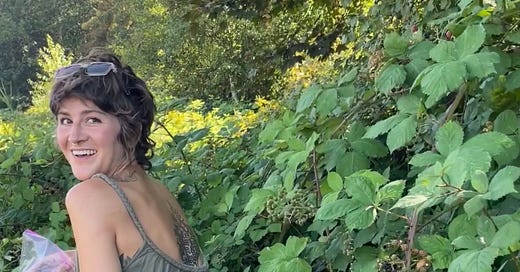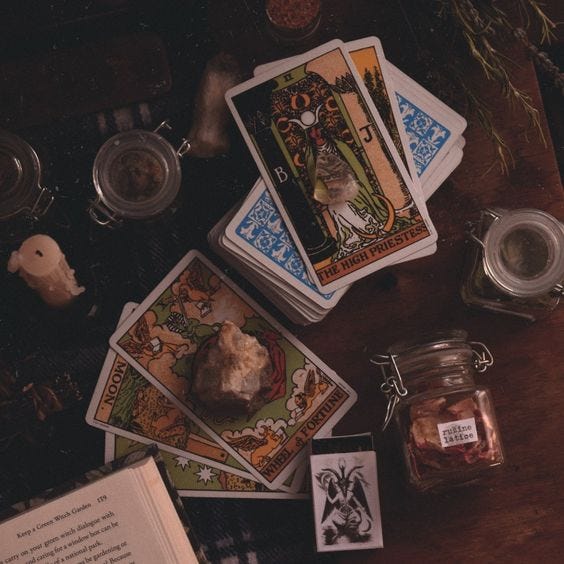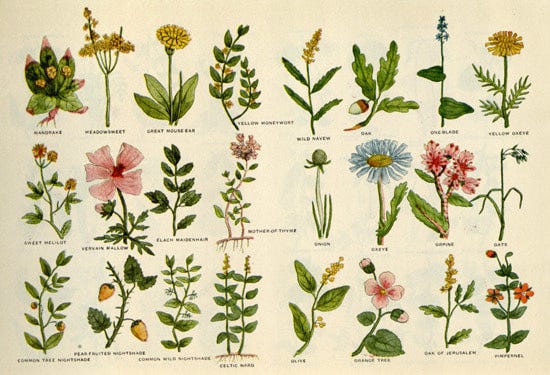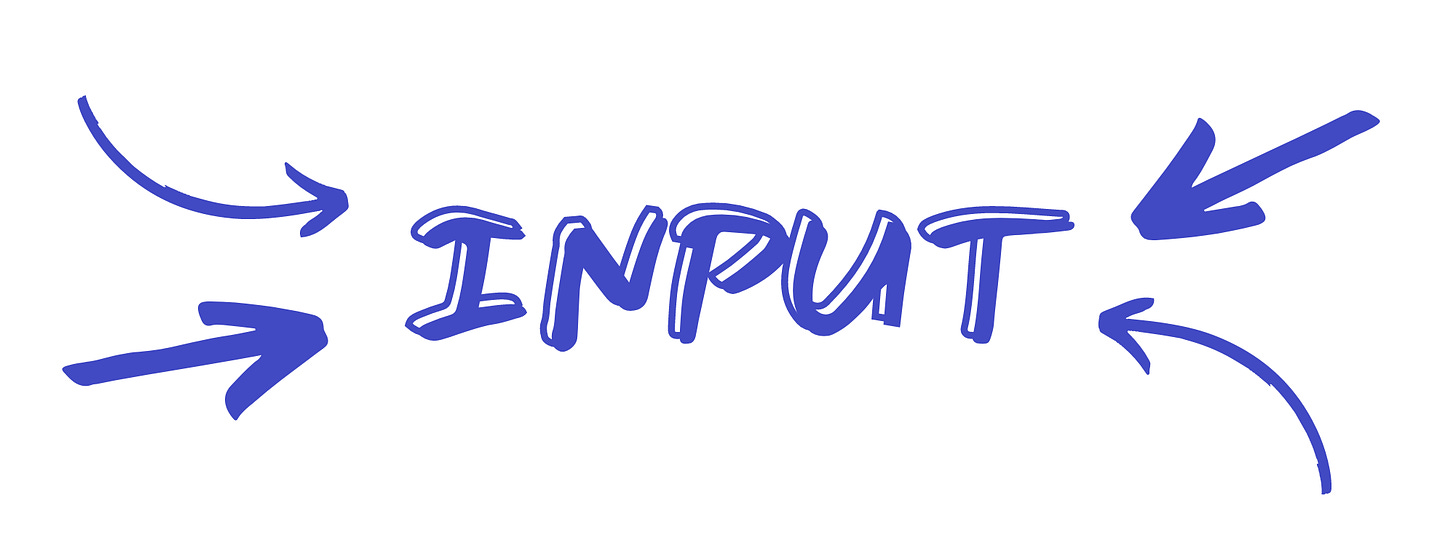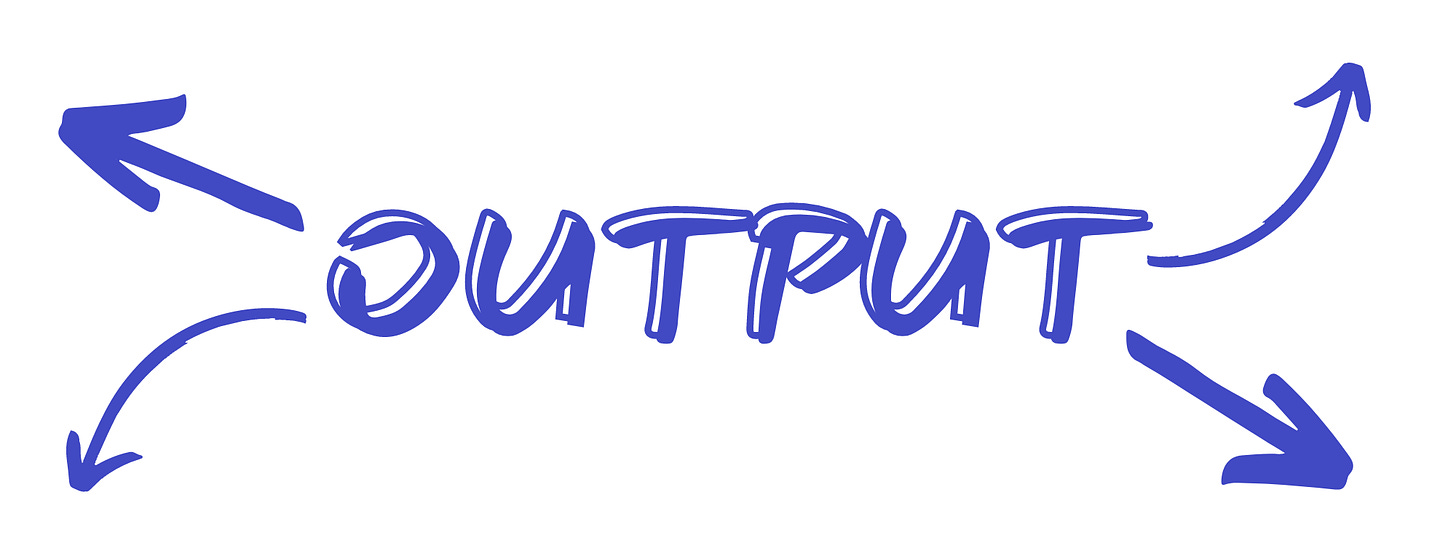The Hive: @markedbyawitch talks herbalism & tarot 🪄
Welcome back to the Hive—Honeycomb's very own artist salon
Welcome back to the Hive, a monthly meeting of the minds where I introduce you to your new favorite creative, or help you learn more about one you already adore.
Today we’re talking to Claire Bonin aka @markedbyawitch, a medically trained herbalist and practicing witch who is passionate about demystifying the world of herbal medicine. It is their hope that their content piques curiosity in plants and gives folks tools to care for themselves with the plants in their cupboards and yards.
They live on Vancouver island with their cat and 15 houseplants. You can find them on Instagram and Tiktok.
The Hive: Claire Bonin of @markedbyawitch
A broken leg first brought Claire to herbalism in 2014, and their tarot practice started soon after.
“I was in the middle of a big transition… I sat on a couch for many, many months, with nothing to do.”
Herbalism became a way to fill the time, fall into research rabbit holes, and help manage their pain and anxiety while injured and couch-bound. As for tarot?
“One of my mentors in herb school was very magical—he’s a druid. He brought a lot of his practice into the way he taught us.”
Together, herbalism and tarot answered questions Claire had always had about, as they put it, “the intersection between the way we think about our bodies and the way we think about our spirits.”
Claire and I recently spoke over the phone early one Tuesday morning. Chatting from opposite coasts, I realized aloud that Claire must’ve woken up at around 5 am just for our call. They laughed—”I’ve always been an early riser”—as they sat beside the water near their home on Vancouver island, watching bunnies tussle and play in the grass.
Katie: I’d love to start by hearing about the roles herbalism and tarot play in your life these days.
Claire: Totally—they’re both so integrated in my day-to-day experience at this point! I start every day with a tarot pull. As for herbs, I have a formula that works for me that I take every day.
One of the things I really love about herbalism is that it's very seasonal. I might walk outside and see the mimosa blooming and I'll be like, 'Oh, maybe today's a good day for some mimosa tincture' or, 'Oh my gosh, look at that peppermint, my tummy has been feeling a little bit weird lately…'
I work on just listening to the change of seasons, and also what the heck's going on with whatever this vessel's doing.
I imagine that seasonality has really shaped how you interact with the world, the earth. Can you tell me more about that?
I'm not an acupuncturist or a doctor of Traditional Chinese Medicine by any means, but the school where I studied herbs gave us a lot of room to study other diagnostic systems as well. The Five Element Theory of TCM instilled in me this really beautiful concept of the way the seasons feed into each other, which is tied into astrology and into the tarot.
These practices make me more aware of things like: summer is for losing yourself in romance, play, and fun, and maybe a little bit of healthy mania. The fall is more about loss. It's a time to revisit some of our griefs—because the fall is all about the lungs, which are related to grief. And then the winter is all about sitting with fear.
I think knowing this framework often keeps me tethered in a way that even when my body or my mind is doing its own thing, I'm able to return to that as my guiding light.
What sort of interplay do you see between these two practices of yours, between herbalism and tarot?
That's a good question—there are certain cards that I associate with certain herbs for sure. But also, the way that I made myself learn the tarot was that I would just sit and stare at a card. And think: what does this bring up for me? Where do I feel my energy going with it?
And the way that I was taught herbs was really similar. It is also a really somatically felt thing.
You know when you have two friends who you just know are gonna hit it off? You're like, 'I can't wait for you to meet this person.' It's kind of like that.
Like studying certain herbs, I might feel like, 'Oh, that vibe! Oh, yeah, okay, that totally reminds me of glaucoma!’
Would you say then that intuition plays a big part in both of these practices for you? And do you think that's true for everyone?
Yes and yes, totally.
When I first started school [for herbalism], I had come from a relatively conservative background straight into, basically, witch school.
Before then, I was like, 'No, I'm special.' But the more time that I spent in that realm, I realized that everyone has some form of intuition that—to a greater or lesser degree—they’ve already tapped into.
The only thing that sets people who practice apart would be that we've really done a lot of work to hone those gifts. But anyone can do it, and it's such a joyful part of life. I think everyone should do it, to be honest.
I want to ask you about something I saw on your site—
“as a colonizer whose roots in herbal medicine do not feel like my own, I offer tarot services alone at this time.”
I'd love to hear more about how you made that decision: what would be your work and what wouldn't be your work.
After herb school, I made friends with a lot of people who are a little less privileged than the people who can afford to go to a post-secondary institution.
I fell into a deep respect for the way that they can tell you about the tides in a place, or the way they were in tune with which side of the island was going to be really good for mushrooms that year. They just had this intimacy with all of it.
I am very much a white person. As the colonizer, I'm still constantly having to look back at myself and realize that a world view or perception has been informed by some pretty gross stuff. I don't think that ever stops, I think it comes with the territory.
In one of your pinned videos on Tiktok, you talk about the science vs. spirituality of plant medicine, and you explain that while you love and believe in the science, you've also experienced things with plants that cannot be explained by science. I love that nuance, and I'd be curious to hear you just speak more to that.
I think anyone who's worked with herbs will agree it’s really hard to explain! The herbs that are coming to me as we're talking about this are linden and mugwort.
Every single person I know who has a relationship with those plants will tell you the same thing—’this plant brought me face to face with something that I was in denial about,’ or, ‘this dream was so on the point that it was a little spooky.’
It's such a pattern with these plants, that it feels like there's something to the spirit of the plant that's doing this. I mean sure, we know that mugwort has thujone in it, and thujone has certain properties and does things to the brain… but it doesn't answer, ‘why does this dream tell me that I have this deep longing to do this thing in a way that my therapist can't even get out of me?’
What’s an herb you feel like most people could benefit from incorporating into their life?
It’s so hard to answer so generally.
If I had everyone on feeding tubes? I think something close to passion flower or skullcap. Everyone is very highly adrenalized these days—by no fault of our own—so I would love to just help everyone achieve a sense of calm.
And what herbs or plants do you find most inspiring for a sense of curiosity or play or creative work?
Let me first say: if you're working with an herb that's right for you, it will put you in touch with that, no matter what the plant is. Our bodies are crazy intelligent.
Beyond that, you know, creativity can feel frivolous to a stressed-out nervous system. So when it comes to being silly, goofy, or playful, Melissa's a really big one. I've never had a bad time with that plant.
[ed. note: Melissa officinalis = lemon balm.]
I'd love to hear you speak to how you approach blocks and/or failure in either your herbalism practice or your tarot practice.
Clarissa Pinkola Estés [author of Women Who Run With the Wolves] made this great analogy in one of her books: if you have a skein of yarn that’s in one great big knot and you’re tugging at the ends, it’s only gonna make that knot tighter. You really have to loosen up, take a step back, and then you can unwork things.
When I was really green in herbalism, I was very much flying by the seat of my pants. I hadn’t experienced too much in the way of real consequences when it came to the possibility of steering someone wrong with a reading or giving them the wrong herb.
For example, at first I would throw these intense plants at people who didn’t need them. I’m an intense individual, and I forget that not everyone is like myself!
I think I was a little bit overconfident in that way, and now I'm a lot more cautious. But I’m also a lot more certain—it's a lot harder to change my mind about things.
Last question: what advice would you give to someone struggling to find what makes them feel curious and creative?
Get on a bike and just go somewhere. Not even a literal bike, necessarily! But force yourself to do something fun, even if you’re not feeling it, and you might find kind of by accident that you're having fun and finding your place anyway. ✵
Below, enjoy Claire’s suggestions for your weekly Creative Input & Output ♡
And be sure to follow them over on Instagram and Tiktok!
***The following are two pieces of creative input. Consider them inspiration to refill your creative cup. I encourage you to give your inner artist a sweet treat this week—even when you don’t think you deserve it, even when you’re hesitant to call yourself a creative person.
1. Listen to Becoming the People with Prentis Hemphill
Hemphill converses with visionaries and innovators who are delving into some of the most pressing questions of today: What is needed for humanity to evolve? How can we build connections that foster collective change, and what is required for our healing?
“This podcast is the most nourishing—it’s just, it’s food. It’s amazing. I love it, and I listen religiously.”
2. Listen to Bobby Deerfield by Niia
A super dreamy, jazz-infused album inspired by one of Al Pacino’s more obscure films by the same name from the 1970’s. The album blends cinematic soundscapes with Niia’s signature sultry vocals, creating a lush, atmospheric experience.
“This album has had me in a literal chokehold. It’s a masterpiece, a masterclass in artistry.”
***The following are three ideas for creative output. Consider them as prompts for creative living in action. Because you have every right to practice your craft, engage your innate human creativity, and have a good time doing it.
1. Get your heart rate up
Claire does this as a daily practice.
Daily movement is a simple way to clear mental blocks and spark fresh ideas—great for shaking off any creative fog and jumpstarting your inspiration.
2. Year-round ocean swims
Claire aims to swim in the ocean at least weekly, no matter the weather.
Regular swims are a great way to stay grounded to the earth, offering a refreshing reset that fuels your creativity with every dip.
3. Goal check in dates with yourself
Claire reflects on their goals on a monthly basis.
Claire says, “In the words of one of my personal heroes Margi Flint: Never ever underestimate the power of writing things down!”
That’s all for now, friend.
Talk soon,
Katie
P.S. Have a suggestion for who should be featured in The Hive next? I’m all ears, simply reply to this email! You’re welcome to nominate yourself or another creative you love.

